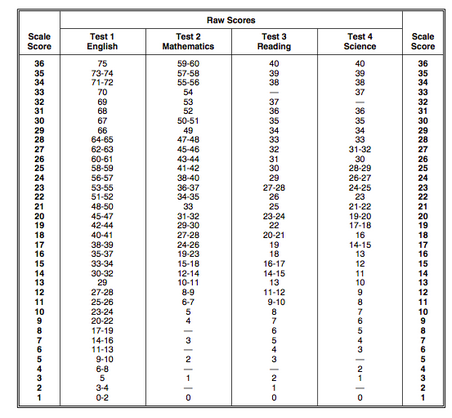
The ACT is a time crunch, and most students have trouble finishing the whole test in the allotted time. So how many questions can you skip for a good score?
In this article, I'll let you know how many questions you can skip or answer incorrectly and to get a composite score of 26.
I classify a 26 as a good score since it is in the 83rd percentile for all ACT test-takers. However, a good score for you is dependent on what college you hope to attend. Click here for guidance on what your target ACT score should be.
First, How Is the ACT Scored?
To answer the questions of how many can you skip for a 26 composite score on the ACT, you must know how the test is scored. In short, the ACT has 4 sections: Math (60 questions), Reading (40 questions), Science (40 questions) and English (75 questions) plus Writing (1 Essay). For further explanation, read How is the ACT Scored?
The ACT Essay score is not counted towards your composite score, so I will not be mentioning it in this article. If you want more information on the ACT Essay, read How to Write an ACT Essay: Step by Step Example.
On the ACT, you do NOT get points deducted for wrong answers, so it is to your advantage to bubble in any questions you can’t answer. Try to save 30 seconds to a minute at the end of each section to simply pick a letter to bubble in for the questions you skip.
Each section is graded separately. First, you get a raw score for each which is simply the number of questions you answered correctly and then that raw score is converted into a scaled score. The raw to scale score conversion changes each test date, but the ACT shared the below table in the Preparing for the ACT guide as an example:

After calculating the scale score for the sections, your 4 section scores are added together and divided by 4 (i.e. averaged), and the final number is your composite score. If your score ends up as a decimal, it is rounded, e.g. if it is a 25.4, it is rounded to 25, and if it is 25.5, it is rounded to 26. Having explained that I will now answer the original question:
How Many Questions Can You Get Wrong or Skip and Get a Good Score?
The answer is a little more complex than one simple number (I will explain this further). The reason the answer is more complex is that the scoring for each section of the test is different, and the scoring for each section varies by test date (as you can see in the chart above and as I will explain further below).
Since you are not penalized for wrong answers, incorrect answers and skips will result in the same score. There are a large number of combinations of individual section scores that would result in a 26 composite score. Here are some of the breakdowns:
(26+26+26+26) / 4 = 26
(26+26+26+25) / 4 = 25.75 (rounds up to 26)
(26+26+25+25) / 4 = 25.5 (rounds up to 26)
(26+26+26+24) / 4 = 25.5 (rounds up to 26)
NOTE: you cannot get a 23 on any individual section if you want to get a composite score of 26 unless you get a section score of higher than 26.
As I said, the scoring of each section varies by test date. So to give you a better idea of the typical number of questions you can get wrong/skip for a 26 in each section, I have analyzed 5 different ACT score charts:
|
|
Test 1 |
Test 2 |
Test 3 |
Test 4 |
Test 5 |
|
English |
13-14 |
14-15 |
14-15 |
14-15 |
14-15 |
|
Mathematics |
16-17 |
18-19 |
16-18 |
16-17 |
18-20 |
|
Reading |
10 |
12 |
11 |
9 |
11 |
|
Science |
7 |
7-8 |
9-10 |
10 |
9-10 |
|
Total |
46-48 |
51-54 |
50-54 |
49-51 |
52-56 |
Overall, you can skip/get wrong around 50 questions per ACT test to get a composite score of 26.
- For English, you can skip/miss 14 questions on average to get a 26.
- For Math, you can skip/miss 17 questions on average to get a 26.
- For Reading, you can skip/miss 11 questions on average to get a 26.
- For Science, you can skip/miss 9 questions on average to get a 26.
What Should Your Skipping Strategy Be?
Knowing this information and hoping to get a 26 composite score, you should plan to skip up to:
- about 1 full passage in English (14 out of 15 questions in the last passage)
- 17 in Math
- 1 full passage in Reading (10 questions)
- 1 full passage in Science (5-7 questions)*
*For Science, I would recommend skipping the Conflicting Viewpoints passage since it is the longest with 7 questions and, therefore, the most time consuming.
Plan your exact skipping strategy based on your strengths and weaknesses. Try to maximize the number you skip in your weakest section. Minimize the number you skip in your strongest section. For example, if you struggle in Reading, plan to skip at least one entire passage. If your strength is Math, try just skipping the last 10 questions. This way you can hopefully maximize your score in Math to balance out your lower score in Reading.
You need to be using the skipping strategy during your ACT preparation! Do not just try to implement this strategy the day of the test. This skipping strategy requires practice since you will need to learn a new test pace. If you had been attempting to complete all questions, you were likely going at a much faster pace. You will need to slow it down and give yourself more time per question.
Also, you will need to figure out exactly what number of skipped questions will give you your target score. For example, while you can skip about one full passage in English (14 out of 15 questions) and get a 26, you may answer 10 questions incorrectly in the 4 passages you do complete, bringing your score below 26. If this happens, try to skip only half a passage (7 questions) on your next English practice test. Try to skip the maximum allowed during your first practice test then change the amount based on whether your score goes up or down.
 STRATEGIZE!
STRATEGIZE!
Plan to spend the entire time allocated except for the last minute on those questions. That way, you get more time per question and do not rush to answer more questions and make more mistakes. If you do have extra time, I would recommend reviewing the answers you were unsure of and NOT attempting any new questions. However, if you felt confident about your answers and have extra time, you should attempt a few more.
During the last minute on each section before time is called, simply bubble in A, B, C, D, E F, G, H, J or K for all of the answers you could not get to. (Note: there is no E or K on English, Reading, or Science.) You should choose two corresponding letters, for example, A and F, to bubble in.
As I said, there is no penalty for guessing on the ACT. By bubbling the same letter for all of the ones you couldn’t get to, you give yourself a 25% chance in English, Reading and Science (1 out of 4 answer choices) or a 20% in Math (1 out of 5 answer choices) of getting each guessed question correct. If you got all of the questions you attempted correct, you would most likely score higher than a 26 by also bubbling in since you will likely randomly get a few of those “correct.”
Could you theoretically skip more questions? While it would be possible to skip more, bubble in, and get a composite score of 26, I would not risk it. Occasionally, the letter you choose to bubble in may result in 0 extra points if it wasn’t the answer to a single question you guessed on, and then your score would end up lower than 26. Don’t risk it. Stick to the outlined plan.
What’s Next?
Need help preparing for the ACT? Check out guides to the ACT Reading, Math, English, and Science sections. Taking the ACT very soon? Read our guide to cramming for the test.
Not sure where you want to go to college? Check out our guide to finding your target school. Also, figure out your target ACT score.
Thinking about getting a job while in high school? Check out our guide to the 8 best jobs for teens and learn how to find yours!












